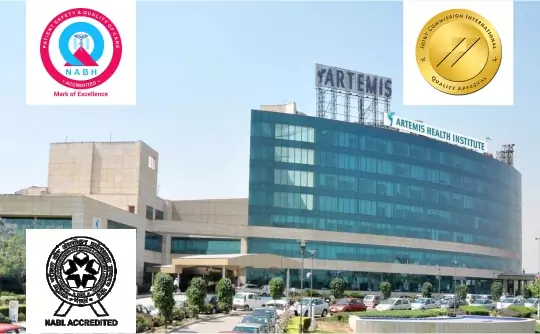

Hysterectomy Cost in India starts from US $2,700 and varies depending on the surgical approach, your medical history, surgeon, hospital and the city where you choose to get the surgery done.
An important expense when it comes to your Hysterectomy is going to be your gynecologist's fees. IndiCure recommends experienced, skilled, board-certified surgeons who are capable of delivering successful surgeries. The charges may vary depending on the experience of the surgeon, popularity, and the approach to treatment.
A significant portion of the overall cost of the surgery arises from the use of any customized surgical instruments or specialized technology. With the hopes of improving patient care, new techniques and technologies are often introduced to the surgical process. Such innovative advancements in the surgical approach can increase costs.
Having your Hysterectomy in an accredited surgical facility by skilled and qualified medical staff is a critical factor. Moreover, the geographical location of this facility also affects the initial quote. But, IndiCure provides you with a projected estimate that will be affordable.
The surgery-related expenses include the pre- and post-surgical expenses. The pre-surgical expenses are associated with the candidacy and the medical history of the patient. This also includes the routine medical exams and tests to ensure you're a good fit for the surgery. Post-surgical expenses may include prescription medications and follow-up consultations.
We at IndiCure, understand that you travel with a budget in mind and do not like to be greeted by surprises after arrival in India. We thus club all these expenses and give you the package cost that is inclusive and affordable at the same time.
Your case manager shall give you an estimated cost of your surgery after discussing your medical reports with the surgeon. The final cost, however, shall be confirmed after your consultation with the surgeon.
In fact, we have Special Negotiated Rates with the Hospitals and you can avail Discounted Rates when you choose to Travel with IndiCure.


We Help you Choose the Right Treatment, Surgeon & Hospital

We Arrange Video/Telephonic Consultation with the Surgeon

We Assist you with Visa & Accommodation

We Receive you at the Airport and Drop you at Hotel/Hospital

We Assist you the at Hospital & Provide Post Operative Support

Gurgaon
Fortis Memorial Research Institute (FMRI), the flagship hospital of Fortis Healthcare, is a multi-specialty, quaternary care hospital and is counted among the best hospitals in India and the world. The hospital is considered as "Mecca of Healthcare" and a referral hospital, not only in the entire Asia Pacific but much beyond.

Gurgaon
Artemis Health Institute, a premium multi-specialty hospital is a healthcare venture launched by the promoters of the Apollo Tyres Group. Established in 2007, Artemis was the first hospital in Haryana to get NABH accreditation within 3 years of start-up.
The uterus is surgically removed during a hysterectomy. It puts a stop to menstruation and the ability to conceive. A hysterectomy may also include the removal of additional organs and tissues, such as the ovaries and/or fallopian tubes, depending on the cause for the procedure.
Hysterectomy can be classified into three different categories.
Hysterectomy may be used to treat:
Open Surgery Hysterectomy: In order to conduct an abdominal hysterectomy, a surgeon creates a 5- to 7-inch incision across the belly, either up-and-down or side-to-side. The uterus is then removed through this incision by the surgeon.
Minimally Invasive Hysterectomy:
You'll need to stay in the hospital for one to five days after your hysterectomy. Your doctor will provide pain medicine and keep track of your vital signs including breathing and heart rate. It's critical to keep walking when you go home from the hospital. You can go for a walk around your house or in your neighborhood.
The majority of women are happy with their hysterectomy results. The majority of women feel their symptoms, including discomfort and vaginal bleeding, have improved. Most women's sexual function and enjoyment, as well as their interest in sex and pain with sex, improves after hysterectomy.
We at IndiCure completely understand your concerns and it is always our endeavor to provide the best outcome for every patient. Following is the list of questions you must ask before you embark on your journey for Hysterectomy in India.
Prepare to answer questions about your:

Although this is a major procedure, new technical advancements, subject matter expertise, and improvements in medical care services have significantly reduced pain, infection risk, and recovery time.
Because this is a procedure that will permanently alter a woman's body, the decision to proceed must be medically justified and should be the last resort. It is strongly discouraged for women under the age of 40 because they are at risk of becoming pregnant. Because the odds of conception decrease around 40-45 years of age, this surgery could be considered proactively for females in their late 40s and beyond who have fulfilled their desire to have children. In all cases, the consent of a patient of any legal age is required.
Many women who are at danger of uterine cancer or who have malignant growths in the womb, ovaries, or cervix find it to be a lifeline. Some women are unable to bear the pain and discomfort caused by fibroids and abnormally heavy bleeding. Hysterectomy may be the best option for permanently relieving pain, preventing severe endometriosis, and preventing uterine prolapse (sagging). This should only be used as a last resort because these illnesses can also be addressed in other ways. Other things could be causing your discomfort or suffering, so getting the right diagnosis is crucial. Only the treating doctor can determine whether hysterectomy is appropriate for the patient.
The operating surgeon will examine the patient and recommend treatment based on his or her medical history and underlying health condition. There are no known lasting contraindications or medical problems that are untreatable. In some circumstances, a hysterectomy may be avoided if the patient has a history or risk of cancer, or if the uterus is big and there are extensive pelvic adhesions.
The length of time spent in the hospital is determined by the type of surgery and the patient's health. You can go home the next day if your surgery is done through the vaginal canal, with a laparoscope, or with robotic-assisted technology. If a big surgical cut or incision is made in the belly, you may need to stay in the hospital for 2 to 3 days under medical supervision.
Because the uterus, a reproductive organ, is permanently removed from the body, the individual will never be able to become pregnant or have biological children. Menopause will also occur, however it will occur earlier than the typical age for menopause. There will be no menstrual periods, as well as mental and bodily relief, which is why hysterectomy was chosen and performed.
It is typical to feel weary and in pain during the first few days after the surgery. Bloody vaginal discharge that lasts a few days or even weeks is common. Doctors will recommend drugs and therapy, such as the use of a heating pad, to help with pain and rehabilitation. The majority of patients return to normal activities within six to eight weeks after an abdominal hysterectomy; however, recovery duration is totally dependent on the surgical approach used and the patient's underlying or post-operative health status. It is critical to follow post-operative instructions and care for a quick recovery. The hospital stay and recuperation period are both reduced with laparoscopic hysterectomy.
Enhance your medical journey to India by availing these extra services.
Traveling abroad for medical reasons may be challenging. With our experience of over a decade and working with the best surgeons and top hospitals in India, we help make your medical tour easier and safer for you. We will guide you at every step of the way and make end-to-end arrangements for your surgery, travel, and stay.
Ramandeep Dhaliwal
a month ago
I had great experience having rhinoplasty through Indicure. Dr. Ruchika from Indicure has helped me in finding best plastic surgeon, answering all my questions...
Read More
Joshua Archer
3 months ago
My name is Joshua Archer I'm from New Zealand, bay of plenty, kawerau I opted for the bypass surgery in January 2023 but planned it in advance for 28 September found IndiCure...
Read More
Kera Ren
8 months ago
Absolutely loved my experience with IndiCure - from first inquiring to meeting the surgeon pre op to my follow up post op. The surgeon was extremely approachable...
Read More
Andreana Paul
5 months ago
Had a wonderful experience. Visited India for my plastic surgery. From sending mails, airport pickup, comfortable accommodation and, to smooth hospital appointment booking...
Read More
Brandi Luce
5 months ago
I had the privilege of using Indicure's services for a cosmetic procedure that I had wanted for a long time but had always been apprehensive about. Ruchika helped me...
Read More
Jade M
3 years ago
Indicure Health Tours went above and beyond my expectations. They helped me with every aspect of my journey and were professional, kind and caring. I was...
Read More
The content on the website (www.indicure.com) is intended to be general information and is provided only as a service. All photographs on our website of before and after results are examples only, and do not constitute an implied or any other kind of certainty for the result of surgery.
Learn about IndiCure Health Tours' comprehensive editorial policy that strives to deliver trustworthy, helpful, relevant, accurate and people-first content on medical tourism in India.
It is not medical advice and should not be taken as medical advice. It should not be used to diagnose or treat a health condition and is in no way meant to be a substitute for professional medical care. You are advised to see a surgeon in person to assess what surgery may or may not accomplish for you.
It is also important to keep your expectations realistic and to understand that all surgical procedures carry risks and should never be taken lightly.